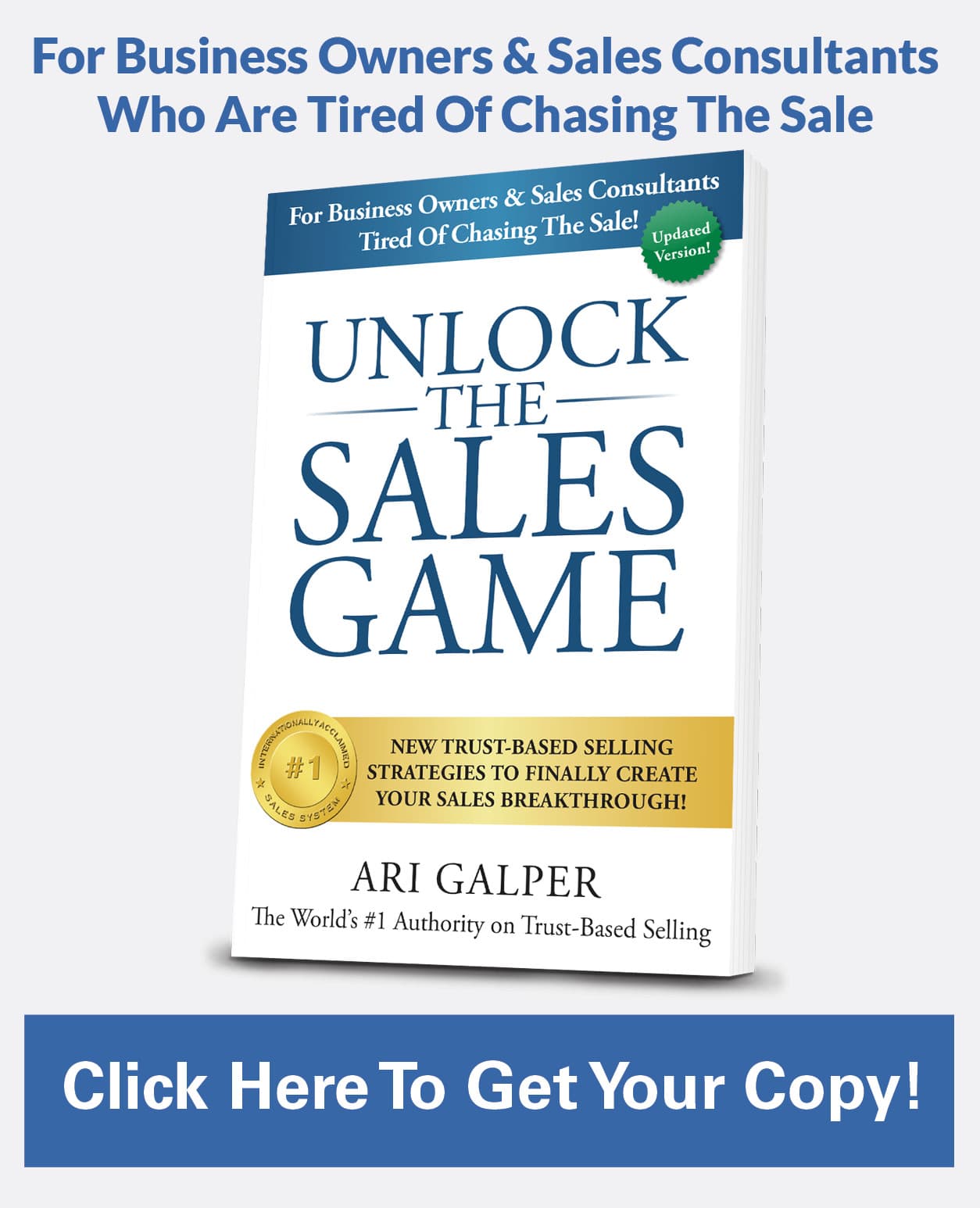Usually when I take on a corporate engagement to transform a sales team to a higher level of sales results, based on the Unlock The Game trust-based sales approach, I always hit a lot of resistance in the first few hours when I’m face-to-face in front of sales team.
I typically expect resistance, because most sales teams believe they’re already selling the “right way”.
When they hear I’m coming into their offices to work with them, the initial buzz is usually:“We already build rapport and ask lots of needs-based questions, I’m not sure what we’re going to learn from this Ari fellow.”
Ahhh, resistance, my specialty.
When I ask them about what sales methods they’ve been exposed to in the past, most of them say they’ve been through consultative selling from some of the big-time corporate sales training companies.
Then they proceed to tell me that when they call into prospective clients, they work hard to build rapport by asking “business needs analysis” questions.
You probably know what questions they’re referring too. Those questions, very popular with many of the high-end sales models back in the 1980’s go sort of like this:
– What business are you in?
– How’s it going?
– What problems are you experiencing?
– What are you doing to fix those problems?
…and on and on, you get my drift.
Those type of questions made up the foundation of the “consultative selling” movement which was very popular back in the late 1980’s and early 90’s.
Most large corporations still base their sales skills development programs on that model.
The reality though, is that consultative selling as we know it is DEAD, specifically based on the model of asking “fishing” questions to initiate a conversation and I’ll explain to you why that is.
Asking those questions worked great back in the 80’s and 90’s when prospects were less likely to be sceptical about taking a phone call from someone they didn’t know.
Back then it was common to not really know much about the prospect you were calling and if you started with really broad questions instead of a sales pitch, you could get pretty good answers and then narrow your questions toward the problems they were facing.
I remember those days pretty clearly, because back then I worked for a Fortune 100 company and sat in the back of the room watching those sales trainers lay out the model with their Powerpoint slides.
That model was embraced by most corporations at the time because it was the best alternative to just picking up the phone and making a sales pitch. It was supposed to be more “relationship-based”.
All of that was fine and dandy… until the dramatic shift in our society over the last 3 to 5 years away from trust – especially from an inbound call from someone you don’t have a previous relationship with.
You see, if your sales team’s “belief system” is they should be asking “probing” questions to properly “qualify” a potential client who they don’t have a previous relationship with, they aren’t developing a client, they’re burning a lead andwasting your company sales productivity time.
Here’s where the “rubber meets the road”:
Even if you still attempt to engage a potential client over the phone using those “consultative” questions and assuming they are willing to cooperate and answer your questions, there is a very high probability they are NOT TELLING YOU THE TRUTH.
Why?
Because you haven’t created trust with them yet.
Trust is absolutely a requirement before your potential client is going to reveal their problems.
And this why I believe the consultative selling model is no longer relevant as a way to initiate a conversation with a new prospective client.
You can’t approach potential clients by FISHING to find their problems anymore, because in this day and age, they just won’t tell you the truth.
The only option you have, which is what we teach here at Unlock The Game, is to enter the conversation ALREADY KNOWING THEIR PROBLEMS.
Welcome to a whole new world of selling, where you enter the dialogue already knowing more about your customers then they know about themselves.
That is the future of selling and that’s why many fast-growing companies have been knocking on my door lately trying to get my attention….because they know the old models of selling will no longer create trusting and profitable relationships to sustain their growth in the future.
When you crack the code on entering a conversation knowing more about your prospect’s issues than they do, you’re guaranteed to surpass your sales targets while at the same time differentiating yourself in the market as a “trusted brand”.
Your comments are welcome below.
To your success,














12 Comments
I do absolutely agree with this. Although a word of caution!
I’ve (recently interestingly) received many sales emails that have been well worded, they’ve obviously done research and are looking to use their expertise to make many of my ‘problems’ go away! All good so far.
Every single one of them have fallen down on one point and are the reason they go in the bin. They can’t resist, following extensive research, from saying they’ve worked with us before, or have been into our offices or attempt to fall back to a untrue statement to build my confidence in them. I can understand that with a larger company this may work but I know for a fact that I’ve been lied to.
“Fortune favours the brave” – trust in your research and you will reap the rewards! Happy selling!
United Kingdom
True! Sales is a game of trust. It is the game of getting people like you. If the customer trust to the salesperson then only he can share his pain or problem.
India
Yes it is very true that Consultative selling has taken the backseat.Engaging the prospect over the phone is not reccomended as you may not hold his attention 100%.Hence there would be a lack of interest.In these times there is more chance of growth thru the website or identifying the right branding vehicle and creating a brand.The human mind tends to retain something that has an attractive domain.
Chennai,INDIA
Dealing with a trust based approach dignifies both the salesperson and the prospect.
NSW, AUSTRALIA
I agree 100% with what you say although I am sure I should be more conscious of the trust-building concept than I am.
St. Louis, MO
I remember sitting in a sales meeting with a couple of dozen sales people. The sales director was at great pains to point out that we needed to do at least 3 face to face meetings per day.
He was a bit concerned that I only did 1 meeting every other day. In reality I had the highest profit and the highest utilisation of credit allocation for all my accounts.
I think old habits die hard, people are almost brain washed to think or believe what they did was best and remains the best.
Regards
Steve
Swindon
You are so right that the sales person should know about a persons business before they walk in the door. This is why IBM teaches their service providers about different industries business processes and issues. Clients dont have the time to give sales people an overview when it is online and listed in FTC documents.
Philadelphia, PA
“there is a very high probability they are NOT TELLING YOU THE TRUTH.”
Isn’t this the truth. Working in sales selling machining services to the large commercial and passanger car conpanies has this written all over it. And because the buyers are not telling the truth it always come back to price…..
So glad to be out of that industry now though 🙂
UK – England
Ari, the entire scope of initial sales calls to suspects/prospects has changed greatly with the advent of Social Media.
Today, prospects expect the salesperson to know about their company and possible ‘needs’. This information is readily available via the company’s website, press releases, etc.
Prospects still cringe when a salesrep calls asking lame questions like you mentioned, “What do you do, What keeps you up at night, etc.”
A smart salesrep will do their research before making that first call and try to find out as much as they can about the company, i.e. recent M&A activity, shortfalls on quarterly earnings, new product launches, etc.
But here’s the rub; Sales Managers are still pushing for volume of calls – make a 100 calls a day or you’re fired! That mentality leaves little time for research prior to making that first call. Unless the salesrep is willing to do their research at night or early in the AM.
A good balance of volume of calls and proper research will yield better results in terms of new business opportunities that are more qualified and that the person we’re talking to is a decision-maker (or at least a strong influencer).
I like Harvey Mackay’s statement, “It’s not about working harder or smarter, you have to work both hard and smart.”
Chicago, Illinois
You know Ari, you are absolutely right. You are the first person who has actually thought this through and given us the truth. Now I know why my team get’s rejected when they try and ask those questions. Very wise…
Tel Aviv, Israel
Hi Ari, I get about 4 calls a day from people who want to provide a service to my house in the Chicago suburbs. Duct cleaning, furnace maintenance, windows. They don’t know that I have been living in Austin for about 4 years.
Also, I got about 8 calls so far from Paychex. They offer to do the payroll for my business. They seem befuzzled when I tell them I already am a Paychex customer.
Sincerely,
Joseph.
This is such great help! Thank you for sharing
Consultative Selling Training